Croatia Remains One of Safest States, Milanović Says
ZAGREB, 15 March 2022 - Croatia remains one of the safest states with the safest cities because "that's a tradition", President and Armed Forces Commander in Chief Zoran Milanović said on Tuesday, adding that Croatia had a quite high level of public security throughout history.
"In that system (communism) and in this system we have always been a country where you could let a child walk out at ten at night. It's been known to happen that some gangs in Split go wild and start shooting with Kalashnikovs, then nothing happens for 100 years," Milanović said at Zemunik Air Base.
He reiterated that the odds of a drone crashing in Zagreb again as it did last week were small, adding that he believed the Hungarians had learnt something from the incident and that it was necessary to strengthen the air defence.
As for the French Rafale fighter jets flying over Zagreb this afternoon, the president said, "they are welcome if they can do that constantly, because it's difficult to control the sky 24 hours a day, seven days a week. At the moment, probably nobody is doing that, not even Israel."
He called on Prime Minister Andrej Plenković to "restrain his associates so that they don't babble about the results of the investigation" into the drone crash until it was over.
"Once again I'm calling on, first and foremost the prime minister, who more or less watches what he says, but some of his associates act like silly children," Milanović said.
The investigation is being done by the General Staff's intelligence regiment, he said, adding that everything they knew he did, too, in real time, but that he did not talk about it until definitive data and conclusions were available.
RBA: Croatian Clients' Money And Assets Safe
ZAGREB, 3 March 2022 - Raiffeisenbank Austria (RBA) on Thursday underscored that the bank is not directly exposed nor is its business directed at the Russian or Ukraine markets, adding that its clients' money and assets in Croatia are safe.
Regarding Raiffeisen Bank International (RBI) and its exposure to the Russian and Ukraine markets and its connection with the local RBA bank in Croatia, "all RBA bank services, products, all domestic and foreign payments, with the exception of those covered by sanctions, are accessible to clients."
RBA Croatia is one of 13 banks within the Austrian Raiffeisen Bank International Group (RBI) operating in central and eastern Europe, RBI said and added that based on experience over the past years, it has developed a proven approach to protect its clients.
The approach consists of conservative management of business activities, preventing the exposure of clients to any significant risk on the Croatian market. It includes a high level of liquidity and capital, which is significantly above that required by European regulators, and a very strict strategy resulting in self-sustainability.
RBA management board president Liana Keserić said that while it is witnessing the destructive consequences of the current conflict for Ukraine's residents, the bank is doing everything to offer its clients what responsible bankers are required to provide - a secure bank and secure access to money, products, and services.
For more, check out our business section.
Croatian and Slovenian Companies to Form Security and Defence Consortium
ZAGREB, 24 Sept 2021 - The Croatian DOK-ING company on Friday signed a letter of intent with the Croatian Orqa and Slovenian MIL Sistemika, Bijol and Defensphere OU companies on forming a consortium of complementary companies in the field of security and defence.
An agreement was signed at the same time between Croatian and Slovenian defence industry competitiveness clusters with the aim of supporting the two countries' defence industries in absorbing available EU funds.
The signing ceremony was held at the 8th International SOBRA Defence, Security, Protection and Rescue fair, which is being held from 23 to 25 September in Gornja Radgona, Slovenia, DOK-ING said on Friday.
The new Croatian-Slovenian consortium comprises members of the two countries' defence industry competitiveness clusters and opens opportunities for joint applications to the future European Defence Fund and use of EU funds for defence.
The consortium is a result of years of promoting the connecting of companies which, through the transfer of know-how and joint action, strengthen their capacity to develop high-tech products and position themselves on the international market.
For more on business, CLICK HERE.
Interior Minister Davor Božinović: Clear Link Between Croatia's Schengen Membership And EU Security
ZAGREB, 8 June, 2021 - The Strategy for the Schengen Area for the first time clearly articulates the link between Croatia's membership of the Schengen Area and the EU's security, Interior Minister Davor Božinović said in Luxembourg on Tuesday.
“The debate today on the Strategy for the Schengen Area is especially significant for us because for the first time it has identified a clear link between Croatia's membership of the Schengen Area and security for the EU as a whole," Božinović said ahead of a meeting of the EU's Home Affairs Council.
The interior ministers of EU member states met in Luxembourg on Tuesday for an initial discussion on the Schengen strategy that was presented by the European Commission last week. The agenda also includes the impact of the COVID-19 pandemic in the fight against organised crime, the internal security outlook in terms of artificial intelligence, cooperation in the fight against terrorism and exchanging opinions on the current status in the discussion on the new migration and asylum pact.
Last week the Commission presented the strategy towards a "stronger and more resilient" Schengen Area, which includes enlargement to EU member states that are still not part of the area, and called for Croatia, Bulgaria and Romania to be admitted into the Schengen Area as they had met the technical criteria for the application of the Schengen acquis.
Božinović said that it was becoming more and more clear that Europe's security was not the sum of security capacities of member states but that it was cooperation, interoperability and solidarity.
"These are the principles that Croatia has insisted upon in European forums for years," said Božinović.
For more about politics in Croatia, follow TCN's dedicated page.
DEFENDER-Europe-21: Zadar Doing Its Part in Large NATO Exercise
May 7, 2021 - As part of NATO, Croatia participates in a large military exercise called DEFENDER-Europe-21, and UK and US navy ships arrived in Zadar with valuable equipment to be distributed among training areas in Croatia and Bosnia and Herzegovina.
Large-scale, multinational, and army-lead, DEFENDER-Europe is a joint exercise designed to build readiness and interoperability between the U.S., NATO, and partner militaries. This year's edition DEFENDER-Europe-21, as reported by U.S. Army Europe and Africa website, focuses on „Building operational readiness and interoperability with a greater number of NATO allies and partners over a wider area of operations is defensive in nature and focused on responding to the crisis if necessary“, and also shows that „the U.S. commitment to NATO is ironclad.“
The exercise also includes strict COVID prevention and mitigation measures, such as pre-deployment COVID testing and quarantining and the U.S. Air Force and U.S. Navy show significant involvement and will utilize key ground and maritime routes bridging Europe, Asia, and Africa – continues the website.
„Exercises new high-end capabilities such the new U.S. Army Security Force Assistance Brigades, air, and missile defense assets and the recently reactivated V Corps and demonstrates our ability to serve as a strategic security partner in the western Balkans and the Black Sea regions while sustaining our abilities in northern Europe, the Caucasus, Ukraine, and Africa“, adds the exercise goals the official U.S. Army website.
Apart from the U.S., Approximately 28,000 multinational forces from 26 nations conduct nearly simultaneous operations across more than 30 training areas in 12 countries, and as a NATO member, Croatia has not been left out of the drill.
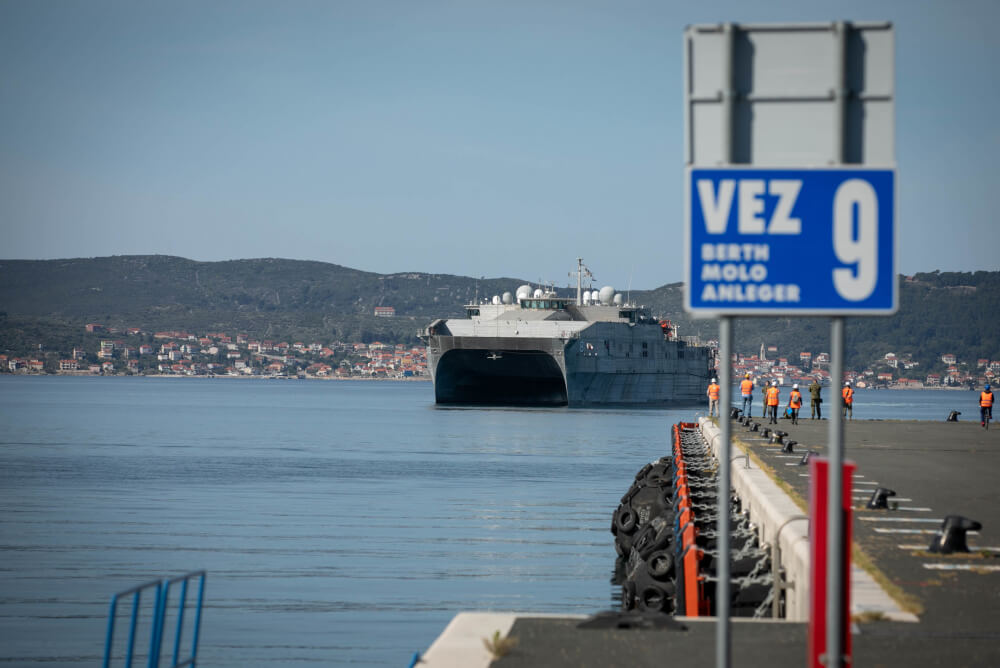
U.S. Naval Ship Yuma arrives in Zadar, Croatia © Sgt. Alexandra Shea
As part of the exercise, U.S. Naval Ship Yuma and U.K. Vessel Hurst Point off-loaded more than 300 pieces of military equipment in Zadar, Croatia’s Gazenica port, after ferrying it from Durres in Albania. The delivery started on Tuesday, May 4, and it was concluded on Friday. The journey of the equipment started back on March 24 at the Port of Jacksonville in Florida. The local U.S. National Guard units were shipping the equipment for three days onto USNS Bob Hope (T-AKR 300) after which, the ship stopped by Portsmouth in Virginia for the final pieces of equipment before heading towards Durres in Albania. In Durres, the smaller vessels took the equipment and finally loaded it to Yuma, and Hurst Point, which brought it to the gem of Northern Dalmatia, Zadar.
„This process is called Joint Logistics Over-the-Shore, a method used to ensure swift delivery of supplies and equipment in a variety of port situations“, explained the press release.
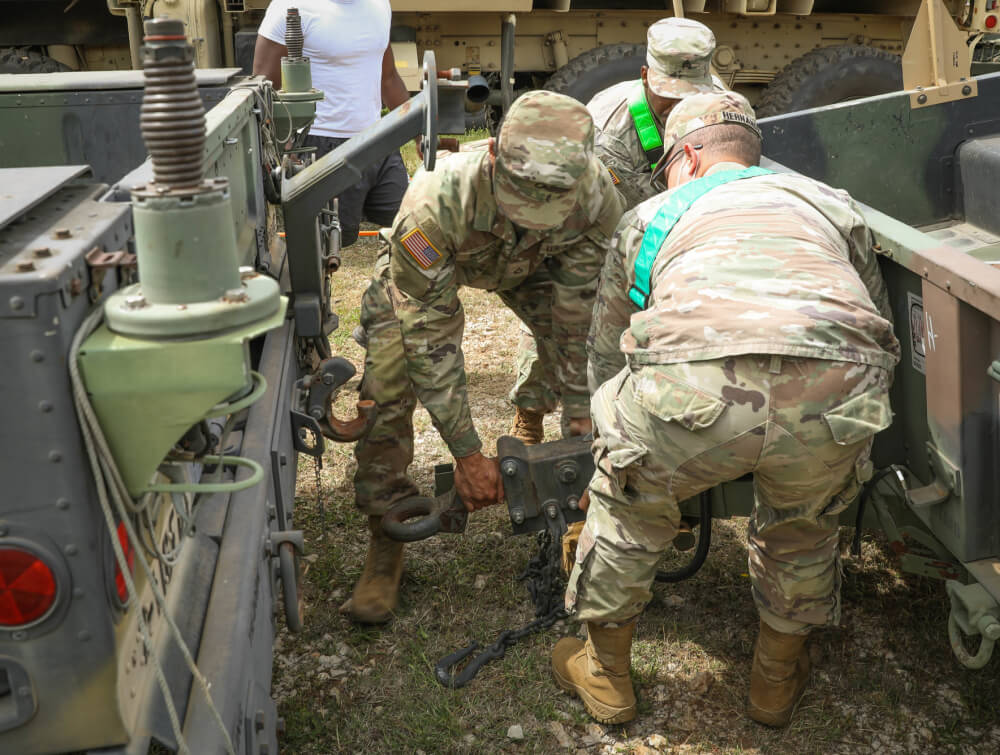 U.S. equipment leaves for training area © Sgt. Joshua Oh
U.S. equipment leaves for training area © Sgt. Joshua Oh
While many would probably stop at Zadar and chill for a lovely holiday, the equipment, however, will continue its journey. Part of the equipment will remain in Croatia, but it will be transferred to Slunj, home of the Main Training Area, and the rest goes to training areas scattered in Bosnia and Herzegovina (BiH). In BiH, the drills and maneuvers for which the equipment will be used are under the umbrella of the linked exercise named "Immediate Response 21” which will culminate in a joint, multinational live-fire demonstration called “Croatian Rampart 1991-2021” at the end of May. Not just as a test of possibility in the „God-forbid-we-are-attacked“ scenario, Croatian Rampart 1991-2021“ also celebrates the 30th anniversary of the Croatia Armed Forces.
The Main Training Area in Slunj, Croatia and training areas throughout Bosnia and Herzegovina to be used in drills and maneuvers alongside members of the Croatian Armed Forces, under the umbrella of the linked exercise named "Immediate Response 21.” The exercise culminates in a joint, multinational live-fire demonstration called “Croatian Rampart 1991-2021” - which celebrates the 30th anniversary of the Croatian Armed Forces at the end of May.

British Major Dan Cornwell talking to Croatian press, screenshot / Defense Flash News
British Major Dan Cornwell told the Croatian press that the idea of being in Zadar is that Croatian, U.K., and U.S. forces operate together in loading U.S. equipment and personnel.
„We've done this before, on exercise last year in Germany, and I can say, it's a lot better down here in the south, it's absolutely amazing to be here in Croatia to do this alongside Croatian Armed Forces where we can better understand how we operate differently, how we operate similarly and equally building up our interoperability and our ability to operate better in the future“, said Maj. Cornwell, indicating that perhaps he can find Zadar, like many others, as a great holiday destination and not just the line of duty.
Learn more about Zadar on our TC page.
For more about the army in Croatia, follow TCN's dedicated page.
$480,000 Invested in Upgrade of Rijeka's Offshore Emergency Response Centre
ZAGREB, 16 March, 2021 - The refurbished building housing Rijeka's Maritime Crisis Centre for Faster Response to Any Disaster off Croatia’s Coastline was officially opened on Tuesday.
The investment into the upgrade of this offshore emergency response centre in the biggest Croatian seaport totalled US$ 480,000, and the lion's share of the investment was provided by the U.S. Army Corps of Engineers.
During the ceremony, the state secretary of the Croatian Sea, Transport and Infrastructure ministry, Josip Bilaver, thanked the U.S. administration and military as well as the US Embassy in Zagreb for this donation in the amount of HRK 3.2 million.
The ministry has invested a million kuna, while the local county authorities provided 100,000 kuna for the project.
"The U.S.-Croatia partnership at sea is essential to the two countries’ NATO military cooperation and shared security. That is why the United States, through the U.S. Military’s European Command (EUCOM), provided assistance to the Croatian Ministry of Sea, Transportation and Infrastructure and the Rijeka Harbor Master’s office to advance training and emergency-response capabilities at sea," the embassy said on its website.
The U.S. Chargé d’Affaires Victoria Taylor, who today joined State Secretary Bilaver for the ribbon-cutting ceremony, expressed satisfaction with the completion of this project.
Over the last decade, the USA has set aside HRK 4.5 billion to support numerous civilian and military projects in Croatia, she said.
The Rijeka centre is described as a a renewed facility that will become "the central point for planning, training, and management in response to emergencies at sea, from supporting persons and vessels in need to addressing maritime accidents and oil pollution."
"The upgraded center will therefore play a critical role in maintaining the safety and environmental stewardship of Croatian coastal waters, ensuring quick action in response to a potential environmental disaster. Protection of the environment is a key priority for both Croatia and the United States, and joint capacity to mitigate against incidents and accidents at sea can make all the difference in a crisis."
The embassy recalls that "Rijeka is already a hub for U.S.-Croatia cooperation, with the port city benefiting economically from nearly 900 million kuna in contracted services by the U.S. Navy for ship maintenance and support since 2011."
For more about politics in Croatia, follow TCN's dedicated page.
Government endorses defence and security university bill
ZAGREB, 4 March, 2021 - The government on Thursday endorsed a bill on the establishment of a defence and security university which will be sent to parliament, with Defence Minister Mario Banožić saying the university would produce leaders for the Croatian army and other components of the homeland security system.
"In the year when the Croatian army is marking its 30th anniversary, a legislative framework is being created to transform the Croatian Military Academy into the University of Defence and Security, which is of special state interest," Banožić said, according to a ministry press release.
The university will facilitate the development of a teaching staff for military, defense, security and intelligence sciences and skills, and it will also be able to apply for EU funding, Banožić said, adding that the university would also develop and conduct scientific research in support of military, defense, security and intelligence activities.
"Working together, we will create an organisation which will be ready to produce leaders for the Croatian army and other components of the homeland security system," said the minister.
Global Terrorism Index 2020: Croatia is a Completely Safe Country
ZAGREB December 2, 2020 – Croatia is a completely safe country, according to the latest figures from the Global Terrorism Index
According to the Global Terrorism Index, Croatia is a completely safe country. Their findings are reported annually by the Institute for Economy and Peace. In their most recent report (published late November 2020), from the year beginning 2018 and ending in 2019, Croatia scored an index rating of 0.0 on the impact of terrorism. This means that, in regards to the threat of and the fallout from terrorism, Croatia is a completely safe country.
In the report, terrorism affects most the citizens of three countries: Afghanistan, Iraq and Nigeria. Terrorist groups are powerful and active in these three nations. On a daily basis, they affect and change the lives of all the people who live in these countries, particularly those who inhabit larger population centres.
The situation is particularly tragic in Afghanistan (with an index rating of 9.5). 41% of all fatal victims of terrorist globally live in that one country alone. The second country most-affected on the list is Nigeria with 9%. Afghanistan and Nigeria were the only two countries which each suffered more than 1,000 deaths from terrorism.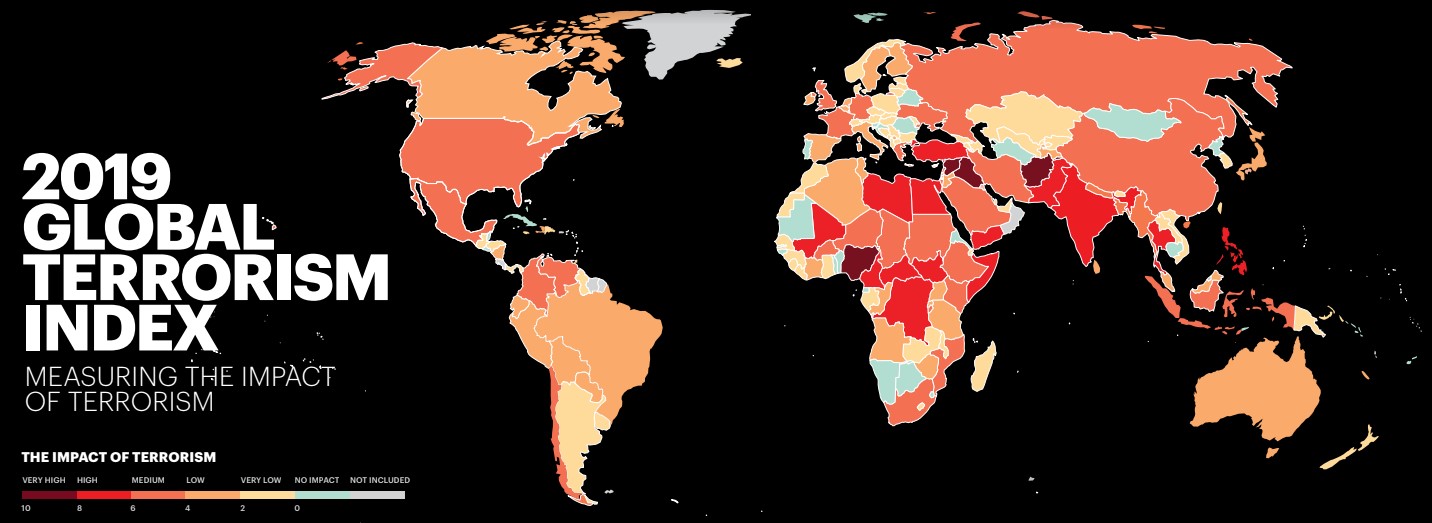 A map showing the impact of terrorism globally. The figures were compiled in a one year period between 2018 and 2019, published as an annual report in late November 2020 © Institute for Economy and Peace (IEP)
A map showing the impact of terrorism globally. The figures were compiled in a one year period between 2018 and 2019, published as an annual report in late November 2020 © Institute for Economy and Peace (IEP)
Globally deaths from terrorism fell for the fifth consecutive year in 2019 to 13,826, a 15 per cent decrease from the prior year. The peak of deaths from terrorism occurred in 2014 and this coincides with the high point of influence of the Islamic State of Iraq and the Levant (ISIS or ISIL). The figures from 2019 show a decrease of 59% since then.
A total of 63 countries recorded at least one death from terrorism in the most recent report. Although dismal reading, this is in fact the lowest number of countries to have reported such since 2013.
The global economic impact of terrorism was US$16.4 billion in the twelve-month period covered by the report, a decrease of 25 per cent from the previous year. However, the true economic impact of terrorism is much higher as these figures do not account for the indirect impact on business, investment, and the costs associated with security agencies in countering terrorism.
ISIS (or ISIL)'s centre of activity has been shown to have moved to sub-Saharan Africa in the period. Total deaths by ISIL in the region have increased by 67%. ISIL and their affiliates were also responsible for attacks in 27 countries in the year period ending 2019.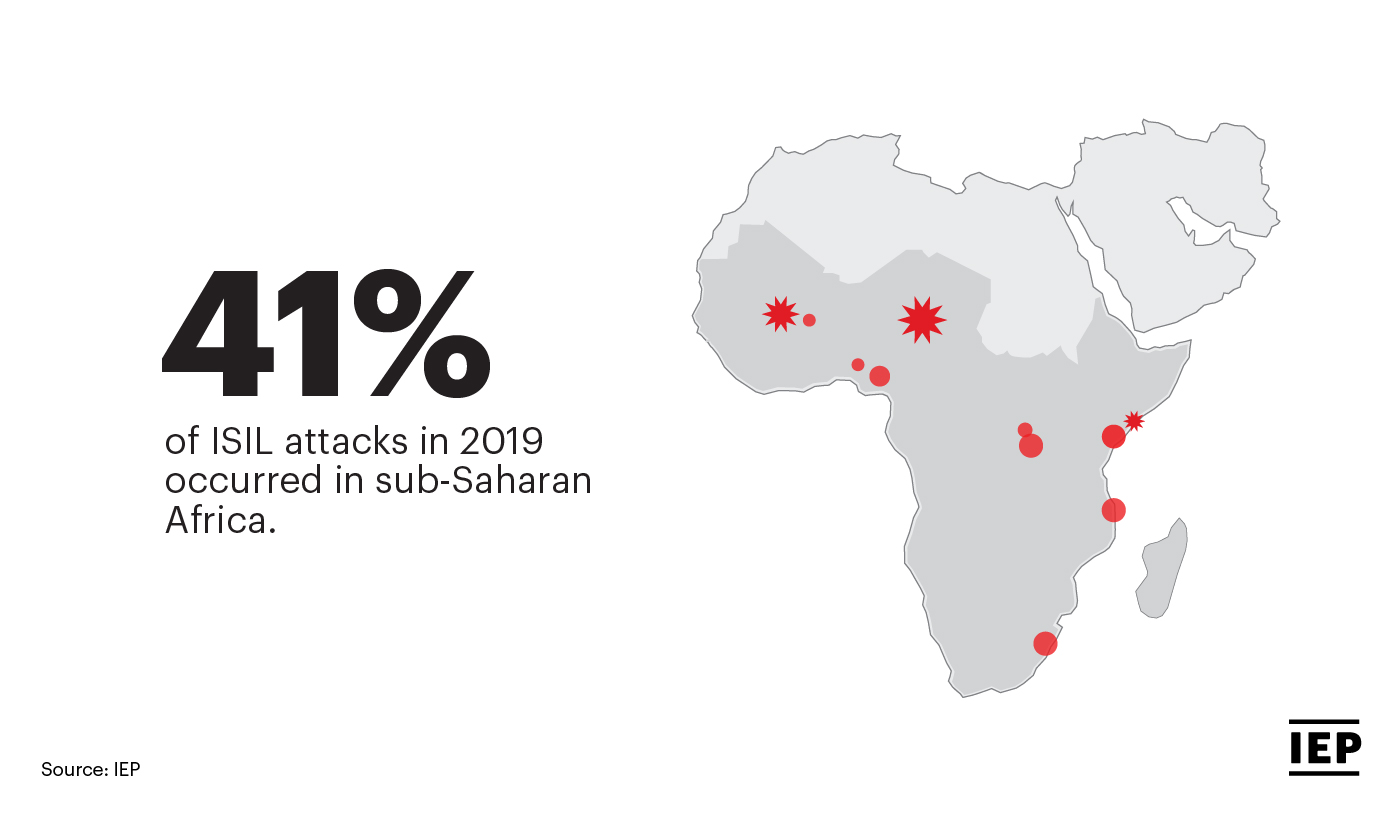 © Institute for Economy and Peace (IEP)
© Institute for Economy and Peace (IEP)
The GTI uses a number of factors to calculate its score, including the number of incidences, fatalities, injuries and property damage. The Taliban remained the world's deadliest terrorist group in 2019; however, terrorist deaths attributed to the group declined by 18%. ISIL's strength and influence also continued to decline. For the first time since the group became active, it was responsible for less than a thousand deaths throughout the year.
It is not yet known whether the attack on government buildings in Zagreb in 2020 will affect Croatia's rating on the index published next year. Although a lone endeavour, Croatian Prime Minister Andrej Plenković is the most high-profile commentator (of many) to have said the attack had elements of terrorism. The global increase in threat from domestic attacks is clearly evident within the rest of the most recent report.
In North America, Western Europe and Oceania, terrorist attacks by groups or individuals involved in far-right politics have increased by 250 per cent since 2014. They are now higher than at any time in the last 50 years. There were 89 deaths attributed to far-right terrorists in 2019. In the USA, white supremacists and other rightwing extremists have been responsible for 67% of domestic terror attacks and plots so far this year.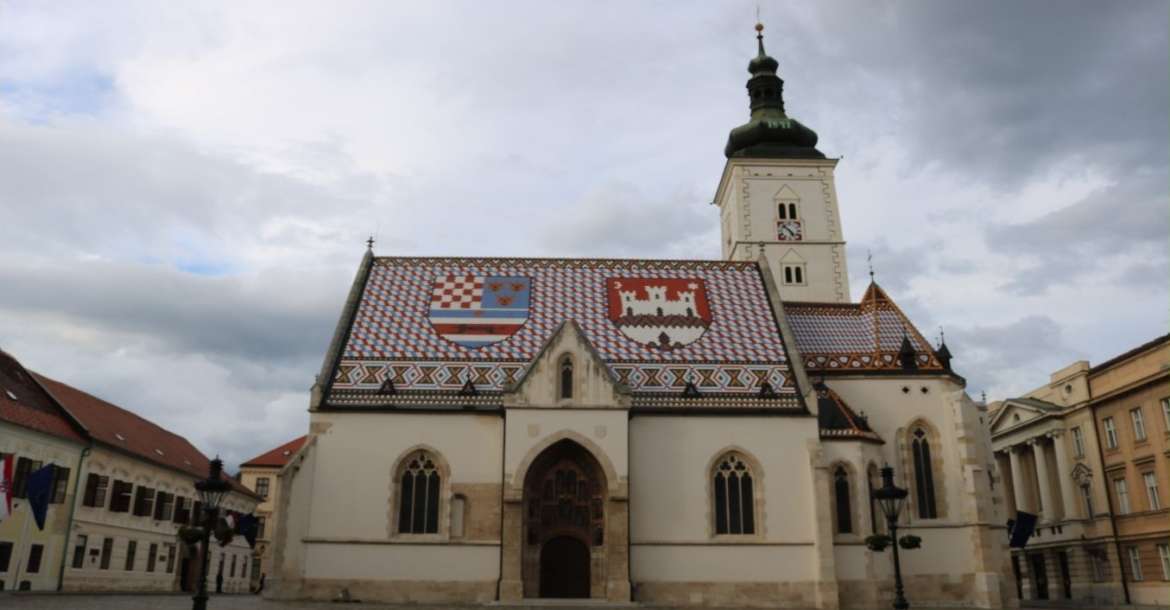 Saint Mark's Square in Zagreb, scene of a shooting in 2020, perpetrated by a Croatian citizen © Marc Rowlands
Saint Mark's Square in Zagreb, scene of a shooting in 2020, perpetrated by a Croatian citizen © Marc Rowlands
There have so far not been any terrorist actions attributable to fundamentalist Islamic groups in Croatia, unlike other European countries such as Spain, Germany, France and the UK. Eastern and southern Europe have experienced more civil unrest in direct correlation with the rise of far-right politics in the region. The popularity of far-right politics has risen ever since the 2008 financial crisis and has continued through the economic recession which followed.
Such trends are expected to continue because of the anticipated and extended economic downturn caused by COVID-19, which is likely to increase political instability and violence. Since COVID-19 was declared a global pandemic by the World Health Organization (WHO) in March 2020, preliminary data suggests a decline in both incidents and deaths from terrorism in most regions in the world. However, it is expected that the pandemic is likely to present new and distinct counter-terrorism challenges.
Of Croatia's neighbours, Bosnia and Herzegovina recorded the largest improvement in the whole of Europe with their 2019 index rating (followed by Austria and Sweden). Only two terrorist attacks were recorded in the country in 2019, compared to six the previous year. Slovenia also scored a 0.0 rating, meaning it can say that it, like Croatia is a completely safe country.
SOA Says State of Security Stable in Croatia
ZAGREB, September 21, 2020 - The security situation in Croatia is stable, and in 2019 there were no event or occurrence which could have constituted a threat to the security circumstance in the country, the Security and Intelligence Agency (SOA) has reported.
There are currently no indications of potential destabilisation of the state of security in the country, reads the SOA report which was made public on Sunday.
Terrorism threat level low
Croatia's current national terrorism threat level continues to be low.
Although the possibility of a terror attack cannot be ruled out, in 2019 there were no indicators of rising threat of terrorism in the country.
The biggest risk concerning this issue are regional followers and sympathisers of Islamist terror organisations and returnees from Syria/Iraq, according to the report.
Seven persons with Croatian citizenship moved into the areas under the control of the Islamic State (ISIL), and two of them were men and five women.
The available data shows that during 2017 and 2018 the two men and a woman died in the Syria/Iraq region and the remaining women of Croat origin are still in civilian camps under the control of Kurdish and Arab forces.
SOA also highlights the fact that not any form of extremism has any strength or potential to topple the democratic constitutional order in Croatia.
The report notes that western Europe is faced with the strengthening of right-wing or anti-immigrant extremism, however, Croatia has not registered any serious anti-immigration extremist movement on its soil.
Islamist radicalism has spread on the southeast of Europe with a marked number of followers, while in Croatia it is marginal with just a dozen people having embraced Salafism, however, they have not shown any inclination to advocate violence.
A risk for the security situation in European societies can be returning "jihadists", and for instance Croatia's neighbours in southeast Europe have reported an estimated 1,000 people who are believed to move to Syria/Iraq to join ISIL. Of that number, a quarter (25%) have died in the Middle East, 30% are still there, and 45% have returned to their countries of origin in southeast Europe.
During 2019, 136 people returned from Syria to those countries in southeast Europe, and of them 12 were fighters who fought for ISIL, while the remaining were women and children.
Five APT cyber attacks countered in 2019
The SOA agency reports that during last year, the authorities detected and stopped five Advanced Persistent Threats (APTs) and some of those attacks had been directed against the ministries of foreign affairs and defence.
So far this year, APT has increased in intensity, and APT attacks are using the circumstances marked by the COVID-19 pandemic. In order to response to these challenges, SOA has set up a centre for cyber and information security.
Concerning the fight against narcotics trafficking, SOA recalls that recently the police in the Canary Islands have seized close to a tonne of cocaine worth more than €40 million, in an operation launched by the Croatian police. Croatia's law enforcement authorities had collected initial information about the transoceanic smuggling of large quantities of cocaine in which Croatian nationals were involved as members of the so-called Balkan cartel.
The operation to break the smuggling ring was carried out in cooperation with the Spanish Civil Guard and French customs authorities. It was also supported by Europol, the Drug Enforcement Administration - Zagreb Office, the UK National Crime Agency, Dutch police, and Bosnia and Herzegovina police.
Security circumstances in Croatia's southeast neighborhood unstable
The countries in Croatia's southeast neighborhood are encumbered with a lot of security, political, economic and social challenges.
Religious and ethnic nationalism still constitutes a problem in those countries.
Occurrences linked to Great Serbia extremism are noticed in some countries and they are evident through attempts to deny the territorial integrity and sovereignty of Croatia as well as of Kosovo, Bosnia and Herzegovina and Montenegro, reads the report.
This extremism is manifest in public appearances and speeches as well as rallies of Great Serbia extremist organisations.
Advocates of Great Serbia extremism are trying to stoke up anti-EU and anti-NATO mood in the southeast of Europe, and are promoting their attachment to Russia.
The report reads that radical interpretations of Islam are still present in southeastern European countries. There are enclaves in which some communities are practising radical Islamic doctrines and do not recognise the law and the democratic order of the countries in which they live, which SOA identifies as a security risk.
Emigration deteriorates position of Croats in Bosnia and Herzegovina
Apart from the political situation in which they are trying to reach the full equality with the other two constituent peoples in Bosnia and Herzegovina, the Bosnia and Herzegovina Croats are also facing a trend of economic emigration, and the further downsizining of this community will affect their survival and consequently the multi-ethnic nature of Bosnia and Herzegovina.
When it comes to the topic of irregular migrants, their numbers have been rising on the eastern Mediterranean route. The Frontex statistics show that along this route, which is also called the Balkan route, there were an estimated 82,000 illegal migrants last year, or 46% more than in 2018.
The report underlines that Croatia should strengthen its energy independence and that the LNG terminal would boost the energy security of the country and its neigbours.
The SOA also highlights that white-collar crime and corruption can stifle the economic development of the country.
For the latest travel info, bookmark our main travel info article, which is updated daily.
Read the Croatian Travel Update in your language - now available in 24 languages
Majority of MPs Support CoE Convention on Safety, Security and Service in Sport
ZAGREB, September 18, 2020 - Members of the Croatian Parliament on Friday supported the Council of Europe's Convention on an Integrated Approach to Safety, Security and Service at Football Matches and Other Sports Events.
Presenting the document, the interior ministry's State-Secretary, Zarko Katic, said that incidents occurred too frequently at football matches as a consequence of poor security management at stadiums.
"Violence is on the rise both inside stadiums and outside as well as in city centres," Katic said.
The purpose of the Convention is to ensure that football and other sports events provide a safe, secure and welcoming environment for all individuals through the implementation of an integrated approach on safety, security and service at sports events by a plurality of actors working in a partnership amid an ethos of co-operation.
However, Marko Milanovic Litre of the Homeland Movement (DP) bench said that he saw the adoption of the Convention as the continuation of rigorous, unjust and discriminatory policies towards a social minority (football fan groups), who he said, demonstrated fairness and integrity and well as unselfish commitment at local and national levels. This DP deputy criticised the practice of keeping records of citizens who attend football events at stadiums as something that can undermine individual rights and freedoms.
the Council of Europe's Convention on an Integrated Approach to Safety, Security and Service at Football Matches and Other Sports Events, which was adopted in Saint-Denis on 3 July 2016, took effect on 1 November 2017.
To date 33 members of the Council of Europe have signed the document, and 16 of them have ratified it.
For the latest travel info, bookmark our main travel info article, which is updated daily.
Read the Croatian Travel Update in your language - now available in 24 languages


